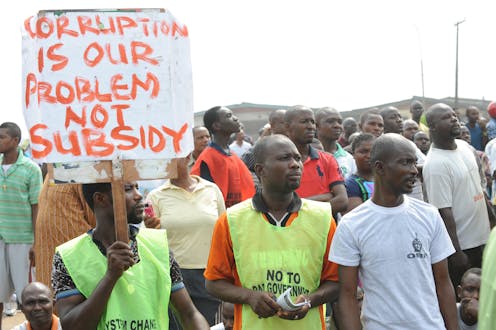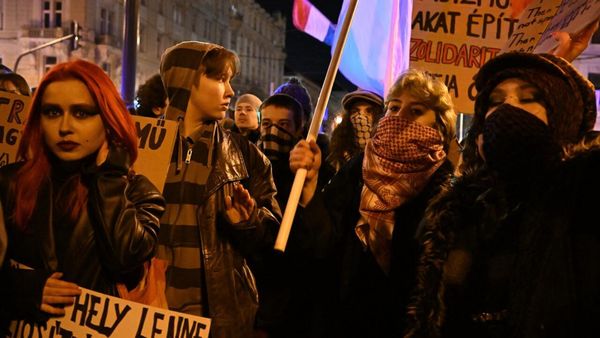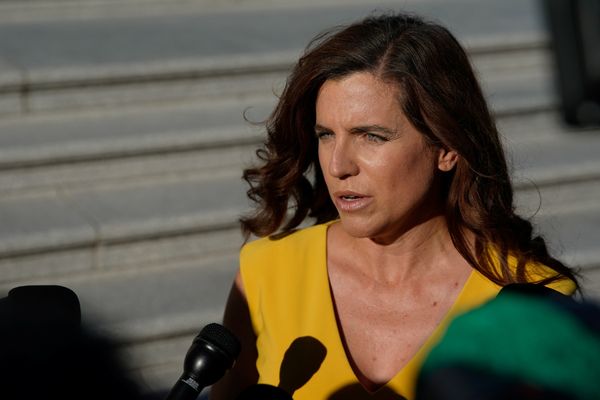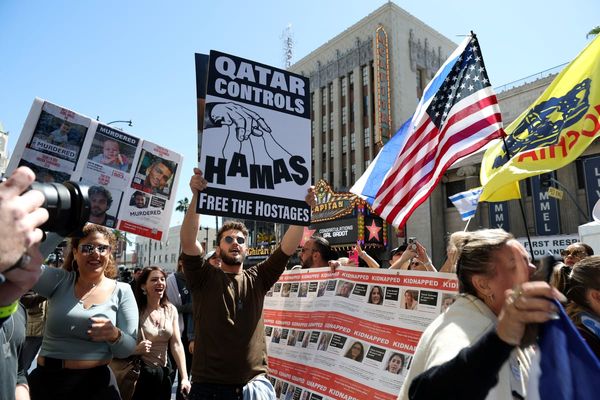
Nigerians are being hit from all sides by a combination of factors that are making their lives increasingly difficult. These include rising cost of living which is reflected in double-digit inflation, stagnant wages, non-payment or the late payment of salaries, a cash crunch and fuel scarcity.
A defining moment could come after the swearing-in of Nigeria’s new president on May 29. It is expected that President-elect Bola Ahmed Tinubu will jettison Nigeria’s fuel subsidy, which is estimated to cost the Nigerian treasury about US$10 billion annually. This is about 24% of Nigeria’s 2022 budget.
Fuel subsidies have been in place in Nigeria since the 1970s. They began with the government routinely selling petrol to Nigerians at below cost. But most Nigerians were unaware that this was being done.
Fuel subsidies became institutionalised in 1977, following the promulgation of the Price Control Act, which made it illegal for some products (including petrol) to be sold above the regulated price. This law was introduced by the General Olusegun Obasanjo regime to cushion the effects of the surging inflation across the world, caused by increases in energy prices.
In recent years the World Bank has been urging Nigeria to remove the fuel subsidy. It argues that failure to do so would exacerbate the country’s fiscal challenges and worsen its debt profile.
The outgoing administration set June 2023 as the date on which the subsidy would be removed. But an announcement in late April said this had been pushed out.
There are concerns that the removal of the subsidy will impose even further hardships on Nigerians by raising fuel and transportation costs. This would further erode their real purchasing power and increase the number of the working poor in the country.
As an economist and Nigerian I have followed debates around subsidies particularly close. Fuel subsidies are not only unsustainable and inequitable, they also lack a sound economic rationale.
Political considerations appear to take precedence over economic logic in this debate. Previous administrations have baulked at getting rid of the fuel subsidy.
In my view removing it could benefit workers and poor Nigerians. But only if carefully managed and implemented. The fuel subsidy should be discontinued, and a significant portion of the savings distributed to low-income Nigerians.
Resentment toward subsidy removal can be avoided if better alternatives are explained to Nigerians.
Three reasons why subsidies are bad
Over-consumption: Setting fuel price below market price encourages over-consumption, with no significant linkage effects on other sectors of the economy. Linkages are usually created when the consumption of a good or service results in the emergence of new economic activities.
Consuming fuel beyond a socially optimal quantity does not have that effect. Instead, it diverts resources away from more productive sectors of the economy. The global trend is to discourage fuel consumption by making it more expensive through higher sales taxes. And by discouraging investment in fossil fuel projects.
Negative outcomes: Subsidising fuel exacerbates pollution, global warming and road accidents - what economists call negative externalities. This is when one person’s actions negatively affect other people that are not part of the actions.
Inequality: Subsidies reinforce inequality. The artificial reduction in the market price of fuel benefits upper income households the most because they are the ones who use the most fuel. They own the most cars in Nigeria, especially the ones that guzzle fuel. Nigeria is among the countries with the least number of vehicles per capita, with 0.05 vehicles per person or 50 vehicles per 1000 Nigerians. With an abysmally low minimum wage of N30,000 per month and non-availability of car loans, most Nigerian workers cannot afford a car.
Solutions
Raise productive capacity: The savings of removing the subsidy should be used to build the productive capacities of Nigerians. These are described by the United Nations Conference on Trade and Development as:
the productive resources, entrepreneurial capabilities and production linkages that together determine a country’s ability to produce goods and services that will help it grow and develop.
What Nigeria needs urgently is an increase in its productive capacities. It could achieve this through:
cash subsidies for restarting moribund but viable industrial enterprises
the provision of subsidised agricultural inputs for farmers
loans to students in tertiary institutions
scholarships for those studying subjects that support industrial development
investment in technology
massive investment in infrastructure, with priority for projects that use direct labour and
a special loan program for entrepreneurs in the informal sector.
Investments such as these would ensure Nigeria gets the biggest bang for its buck, rather than the current wasteful spending on the corruption-infested fuel subsidies regime.
Nigeria’s fuel subsidies have encouraged arbitrage, whereby unscrupulous business people buy fuel at the subsidised price and resell it at a higher price across the country’s borders. This practice is partly responsible for the perennial fuel scarcity in Nigeria.
Cash transfers: Savings from scrapping the fuel subsidy could be used to augment Nigeria’s Conditional Cash Transfers programme. This was introduced in 2016 as part of the Buhari administration’s Social Investment Program (SIP).
Eligible individuals are entitled to a monthly cash payment of 5000 Naira (about US$11). But only 784,176 individuals received the payment in 2020.
Fuel subsidy removal will enable the government to significantly increase this number. Individuals with an income of N30,000 per month or less should qualify for a new cash transfer program. It can be designed to last for six months.
To cushion the effects of subsidy removal, the Nigerian government has obtained an $800 million relief package from the World Bank. The money, which should be added to the pool of funds available for the conditional cash transfer program, is expected to be distributed to 10 million households as cash.
Apart from being an assurance that the government does care for them, a cash transfer would also help stimulate the economy by spurring the demand for goods and services, which has been stagnant.
The inflationary impact of cash transfers from fuel subsidy savings will be minimal, since new money is not created in the economy. In any case, inflation in Nigeria is mainly due to supply constraints, rather than demand.
Safety nets: There are no institutionalised safety net programmes for most Nigerians, which is why they regard the fuel subsidy as one way in which the government supports poor people.
The harsh reality is that fuel subsidies benefit mainly upper class households, who consume most of the fuel in Nigeria.
To overcome the perception – and to provide genuine support for those struggling to survive – the government should use the savings to subsidise mass transport systems, agricultural inputs, education, affordable healthcare and low-income housing.
Conclusion
At first blush, one might think it’s politically risky for the Bola Tinubu administration to start on the rocky foundation of scrapping Nigeria’s fuel subsidy.
But fixing difficult and politically unpopular economic problems is a hallmark of effective leadership.
If implemented properly, fuel subsidy removal may be an important legacy of the Tinubu administration, one that will differentiate him from past administrations.
Stephen Onyeiwu does not work for, consult, own shares in or receive funding from any company or organisation that would benefit from this article, and has disclosed no relevant affiliations beyond their academic appointment.
This article was originally published on The Conversation. Read the original article.







